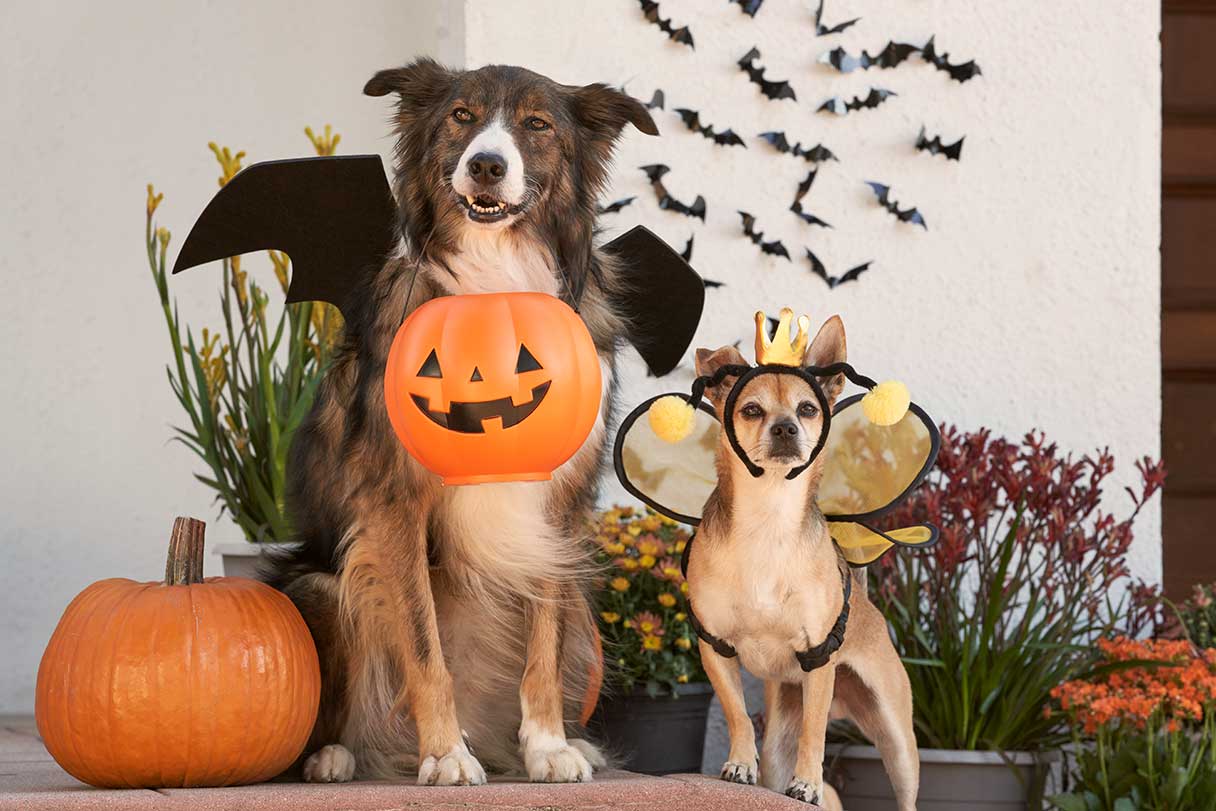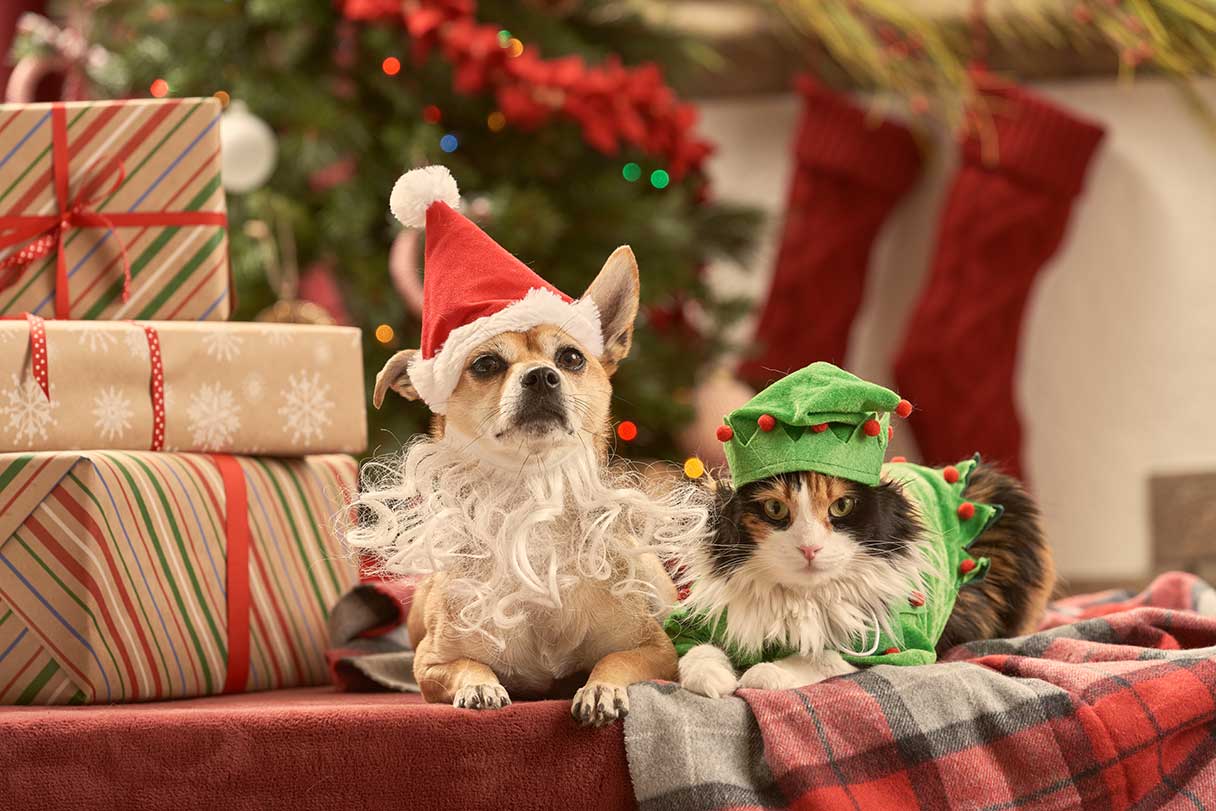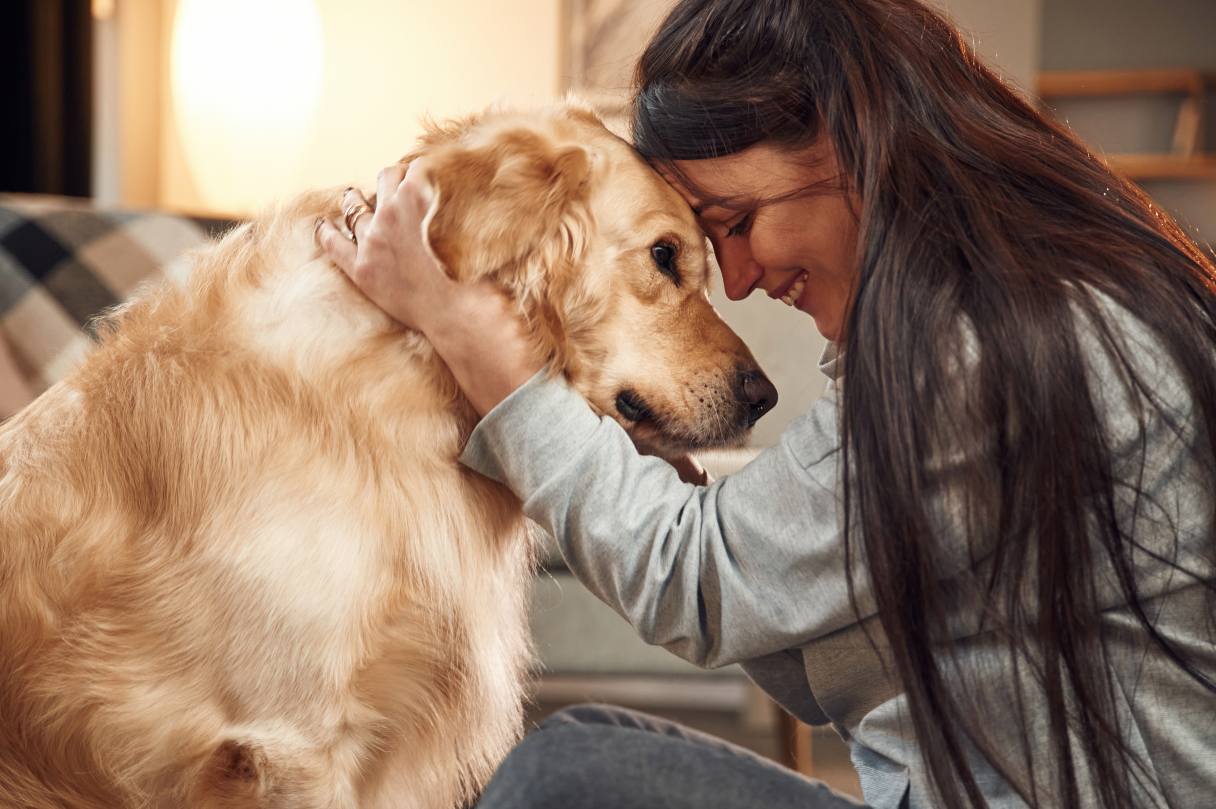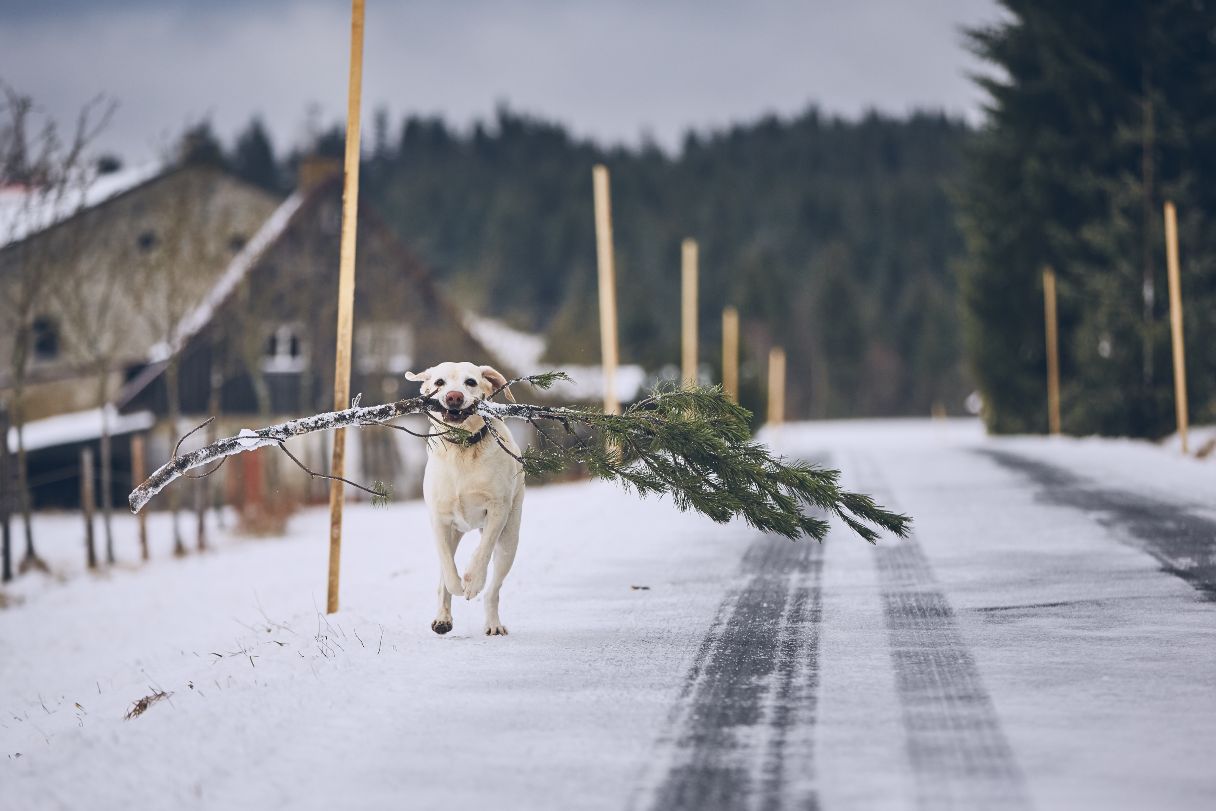From trick-or-treat sweets to holiday-themed dishes, Halloween includes an abundance of tempting foods. While munching on chocolate or enjoying a glass of adult “witches’ brew” is safe for people, these treats — and many others — can pose a hazard for our four-legged friends. Keeping your dog safe on Halloween includes knowing which foods to keep out of reach. Review this list of treats that can be toxic to dogs, along with our tricks for keeping your pup safe during the Halloween season.
Here are nine foods you may see around the cauldron this Halloween, but you’ll want to keep your pup away from.
1. Chocolate
Chocolate contains chemicals called methylxanthines — including theobromine and caffeine — that are highly toxic to dogs. However, some dogs find this tempting treat irresistible and commonly seek it out. In fact, 13.6% of exposures recorded by the ASPCA Animal Poison Control Center (APCC) during 2024 were due to chocolate ingestion.1
While all types of chocolate are toxic, darker chocolate contains more concentrated amounts of toxins than those found in milk chocolate. This chart includes the toxin concentration found in different types of chocolate.2
| Chocolate type | Methylxanthine concentration (milligrams of per gram of chocolate) |
|---|---|
| Baking chocolate | 15.5 mg/g |
| Cocoa powder | 28.5 mg/g |
| Dark chocolate | 5.3–5.6 mg/g |
| Milk chocolate | 2.3 mg/g |
White chocolate contains a negligible amount of methylxanthines, although consuming a large amount can lead to gastrointestinal (GI) upset and pancreatitis.
The toxic effects of chocolate depend on the amount of methylxanthines ingested relative to the weight (in kilograms) of the dog. At 20 mg/kg body weight, mild signs such as vomiting and diarrhea may occur. At 40 mg to 50 mg/kg, cardiovascular effects such as increased heart rate and arrhythmias can develop. Doses over 60 mg/kg can lead to seizures, and death can occur at 100 mg/kg.2
2. Foods Containing Xylitol
The artificial sweetener xylitol is found in many sugar-free food items, including sugar-free candy, peanut butter, gum and baked goods. When ingested by dogs, xylitol causes a severe drop in blood glucose (hypoglycemia), leading to signs such as vomiting, weakness and lethargy. At high doses, seizures and coma are possible. Liver failure can also develop, although signs are often not apparent until 24 to 48 hours after ingestion.
3. Grapes and Raisins
Grapes, raisins and grape products, including grape juice and wine, are toxic to dogs. Although the exact mechanism is not understood, toxicity is likely due to high levels of tartaric acid found in grapes. Toxic effects vary by dog, with some dogs unaffected and others developing life-threatening kidney failure after eating only a few grapes.
4. Certain Nuts
Eating macadamia nuts can lead to toxicity in dogs characterized by vomiting, lethargy, weakness, ataxia (lack of balance), muscle tremors and increased body temperature. Toxicity is not life-threatening and typically resolves within 24 to 48 hours without treatment.
Other nuts, such as English walnuts and almonds, can cause GI irritation, and their high fat content can lead to pancreatitis. Black walnuts, which are the wild-grown walnuts that squirrels often bury, contain a toxin called juglone, which can cause vomiting and diarrhea in dogs.
5. Alcohol
If your costume party includes a spooky spiked punch, drink or dessert, ask guests to keep the holiday spirits out of your dog’s reach. Even small amounts of alcohol can cause intoxication in dogs, who can experience lethargy, ataxia, vomiting and diarrhea. In severe cases, life-threatening respiratory depression can develop.
6. Caffeine
Caffeine is found in chocolate as well as many drinks, including coffee, tea, soda and energy drinks. Dogs are more sensitive than people to caffeine’s effects, which include GI upset, hyperactivity, muscle tremors, seizures, increased heart rate and blood pressure and arrhythmias. At higher doses, collapse and death are possible.
7. Halloween-Themed Salt Dough Ornaments
Ingestion of large amounts of salt, such as in salt dough decorations or homemade play dough, can lead to toxicity in dogs. Salt toxicity can cause vomiting, diarrhea, weakness, muscle tremors and excessive thirst and urination, as the body tries to flush out the excess sodium.
8. Moldy Food
Jack-o-lanterns, gourds and corn cobs used as porch adornments can become moldy over time. If your dog eats these moldy decorations, they can become sick from the mycotoxins produced by the mold.
9. Bones
Although most families don’t have a Halloween feast, you may want to give your dog a special treat — and allowing them to gnaw on a large femur bone would be fitting! However, bones are never a good idea, as they can cause a host of problems. Cooked bones can cause injuries such as broken teeth and mouth wounds, while raw or undercooked bones can lead to GI infections. All bones pose a choking hazard.
If you want to give your dog a long-lasting treat to distract them from the constantly ringing doorbell and parade of costumed goblins, try a frozen toy stuffed with a special dog-friendly treat instead.
Tips to Keep Your Dog Safe From Toxic Foods
Keeping your dog safe from Halloween hazards doesn’t have to involve witchcraft or a magic spell. Use these tips to enjoy a safe holiday with your dog.
- Don’t take your dog trick-or-treating. Your dog may find dropped candy or wrappers on the ground and gobble them up while you’re distracted.
- Give pet-safe Halloween treats. Giving your dog a special treat can help them feel like part of the fun and avoid temptation. Try pieces of plain, air-popped popcorn, a toy filled with pureed pumpkin and kibble or a commercially made Halloween dog treat.
- Know what your dog can and can’t eat. Review the above list of toxic foods and share it with your family so everyone knows how to help keep your dog safe.
- Pass on partygoing. If you’re hosting a Halloween bash, keep your pooch away from the festivities. If they want to say hello, keep their visit short and ask guests not to give them any treats.
- Provide a safe space. If you’ll be opening your door to trick-or-treaters, keep your dog in another part of the house where they can’t dart outside or help themselves to the candy bowl.
- Store candy safely. When your trick-or-treaters return home, keep your dog in a separate area while the kids sort through their haul. Instead of allowing kids to keep candy in their rooms or on the kitchen table, designate a space in a cupboard or the pantry where your dog can’t access it.
What You Can Do if Your Dog Eats a Toxic Halloween Food
If you think your dog might have eaten a toxic food from this list, or something else that could be harmful, treat it like an emergency.
Although signs of toxicity depend on what your dog may have eaten, common signs to watch for include:
- Ataxia
- Collapse
- Diarrhea
- Difficulty breathing
- Increased heart rate
- Lethargy
- Muscle tremors
- Seizures
- Vomiting
Even if you don’t notice signs of distress but think your dog might have ingested something potentially harmful, call the ASPCA immediately. The veterinarian you speak with will determine whether your dog is in danger and tell you what to do next. It is recommended to call even if you plan to take your dog to the emergency hospital, as many hospitals require pet owners to call before they will begin treatment.
Prepare for a Dog-Safe Holiday
Although Halloween can present many hazards for dogs, you can help your four-legged friend enjoy this spooky holiday safely. Keep toxic foods out of your dog’s reach and protect your pooch by providing special, dog-safe alternatives. If you have any concerns about your dog’s health, contact your family veterinarian or a local emergency hospital for advice.
CareCredit Credit Card Financing for Dogs
The CareCredit credit card provides a convenient way to pay for your dog’s vaccinations and other health and wellness expenses, including exams, medications and products at providers in the CareCredit network.* Continue your wellness journey by downloading the CareCredit Mobile App. You can find a provider on the go, manage your CareCredit account and easily access the Well U blog for more great articles, podcasts and videos. Use our Acceptance Locator to find a veterinarian that accepts CareCredit to help keep your pet healthy and happy for a lifetime of love.
In addition to pet care, you can also use your CareCredit credit card for dentistry, cosmetic, vision, hearing, health systems, dermatology, pharmacy purchases, spa treatments and so much more within the CareCredit network. How will you invest in your health and wellness next?
Author Bio
Angela Beal, D.V.M., has more than 20 years of experience as a veterinarian. Leveraging her background in private practice and academia, she uses her passion for writing to convey information to pet owners to help them keep their pets healthy and happy.








